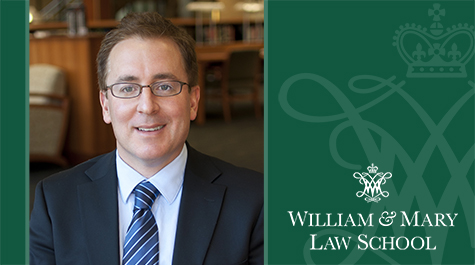William & Mary’s Timothy Zick Answers the Media Call About Public Protest
Constitutional law expert Timothy Zick, the John Marshall Professor of Government and Citizenship and Cabell Research Professor at William & Mary Law School, has been particularly busy lately—especially in light of recent public protests. That’s not surprising given that his first book was about Speech Out of Doors, and his fifth book (now in the planning stages) is tentatively titled What Democracy Looks Like: A Citizen’s Guide to Public Protest.
Knowing his expertise, the press and others have sought him out.
“With regard to protesters’ rights, I’ve been contacted by a number of media outlets including CNN, the Washington Post and Voice of America,” Zick said. “I was also contacted by a law firm representing clients who are suing the federal government for violation of their First Amendment and other rights in connection with the clearing of Lafayette Square Park in Washington, D.C.”
Zick also worked on an amicus brief in Doe v. Mckesson, a case involving the liability of a Black Lives Matter protester for injuries sustained at a police misconduct protest, that is currently pending at the Supreme Court.
The most unusual interview Zick did recently was for Landscape Architecture Magazine, which is publishing a story on recent laws limiting protests near natural gas pipelines and other “critical infrastructure.”
People reaching out to Zick to discuss protest are looking for several things. Reporters want to inform readers about basic protest rights, including where protests are allowed and what sorts of regulations government can impose on speech and assembly. Likewise, many of Zick’s neighbors who are participating in public protests relating to George Floyd and policing abuses have asked similar questions.
“It’s important that activists and the public have a basic understanding of protesters’ rights,” Zick said. “It’s also important that the public draw a distinction between peaceful and lawful protests and ‘rioting.’ Too often people falsely equate protest and ‘riot.’”
All this engagement could not be more timely in terms of Zick’s current work. He is completing edits on an article relating to the civil liabilities of protest organizers and activists, which relates to his planned Citizen’s Guide to Public Protests. The book will address various issues relating to the law of public protest including protest policing, armed protests, and protest during pandemics and other emergencies.
“When I started writing the book, public protest had effectively been shut down by pandemic-related restrictions,” Zick said. “The last few weeks have demonstrated that not even a pandemic can keep people from protesting. Some initially protested the restrictions on assembly and other public activities, and then the mass racial justice protests occurred.”
Zick has long been a true believer in the power of dissent to facilitate social, political and constitutional change. He says that recent protests have again demonstrated the power of collective public dissent.
“The mass racial justice protests have been remarkable displays of contention, solidarity and hope,” he said. Zick continued, “Even in a digital era, this is what democracy looks like.”
Zick noted that public protesters still face many challenges, including overly aggressive protest policing. Further, he said, “As is always the case, public protest will not be sufficient to bring about change. Protesters now must work to translate their collective dissent into policies and laws.”
About William & Mary Law School
Thomas Jefferson founded William & Mary Law School in 1779 to train leaders for the new nation. Now in its third century, America’s oldest law school continues its historic mission of educating citizen lawyers who are prepared both to lead and to serve.
